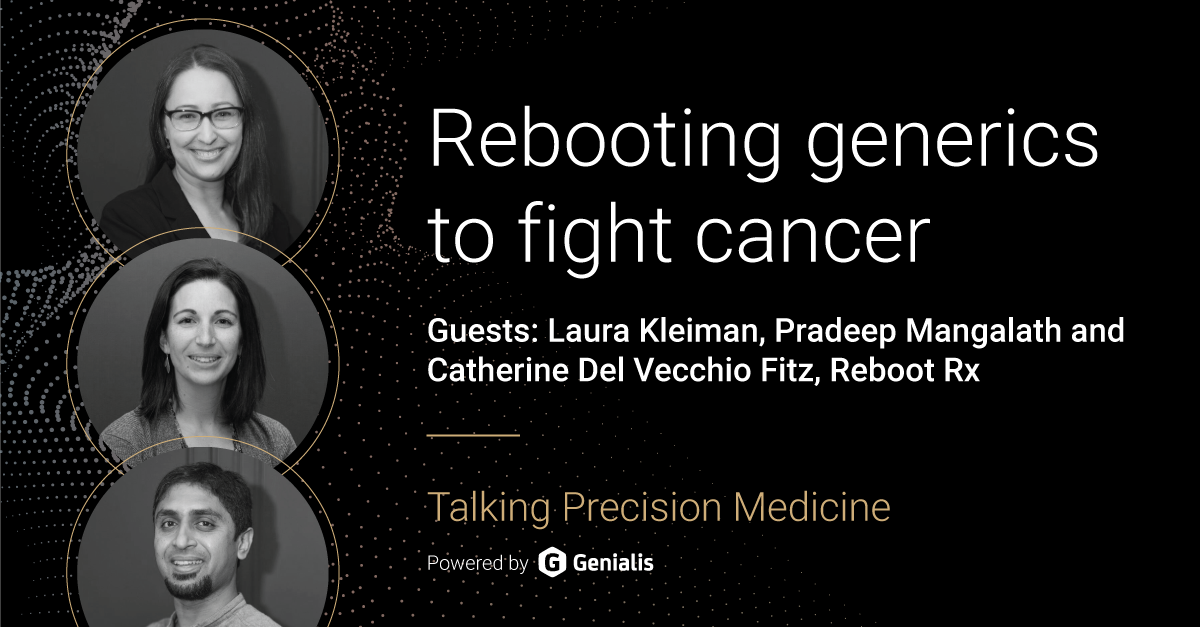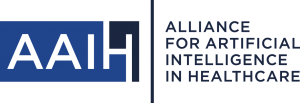Welcome to the Talking Precision Medicine podcast. In this series, we sit down with experts on the application of AI and big data analytics in the drug discovery space. Our guests are innovators, business decision makers and thought leaders at the intersection of data and therapeutics. We discuss the promise, practice, challenges, and myths of AI in precision medicine. This show is brought to you by Genialis, and Rafael, our CEO, is your host.
Genialis is focused on data integration and predictive modeling of disease biology to help accelerate the discovery and de-risk the development of novel therapeutics.
Reboot Rx is a different kind of biotech startup. Reboot’s mission is to find generic non-cancer drugs that can benefit cancer patients quickly and affordably. And as a not-for-profit, Reboot can stay focused on its mission.
Given the number of paradigms Reboot hopes to shift at once, we decided to talk with all three co-founders: CEO Laura Kleiman, COO & CTO Pradeep Mangalath and CSO Catherine Del Vecchio Fitz. Each one provides perspective on their part of the puzzle.
Let’s get right to it.
Links:
- https://rebootrx.org/
- Reboot: COVID-Cancer Project
- Laura Kleiman LinkedIn
- Catherine Del Vecchio Fitz LinkedIn
- Pradeep Mangalath LinkedIn
Episode highlights:
- It takes 10 years and a billion USD to develop one new drug to treat cancer. Cancer patients don’t have time to wait that long, they can’t afford the drugs which end up costing $100,000 a year per person.
- However there are hundreds of non-cancer generic drugs that have already shown potential benefit for cancer in pre-clinical or early clinical studies. But there is so much data on these drugs that it’s really hard to know which ones are most worthwhile to pursue. There are also no incentives for pharmaceutical companies to find new uses for off-patent and inexpensive generic drugs.
- Generic drugs have a history of safe patient use – they have usually been in use for many years, they are low cost and many of them are widely available.
- Reboot Rx is building technology to figure out which repurposed therapies are most likely to help cancer patients live longer and better.
- They are aggregating different data types with information on potential drug benefits: published studies, real-world data endpoints such as data from the electronic health record, patient & physician reported data, publicly available screening datasets, etc.
- It takes approximately 6 months of full time work to review all of the published data on one repurposed drug and all of the evidence for its potential effects on cancer. It would be impossible to manually review the data for all 2000 generic drugs. This is why they are using AI and machine learning to sort through large amounts of data faster and more efficiently.
- Their analytical pipeline consists of three main steps: extraction of data, extraction of relations between different entities and drug ranking. Using language processing models (trained on their carefully curated datasets) they are trying to: identify relevant abstracts for their scope, identify the cancer and drug entities within relevant abstracts and establish a multilayered class label of efficacy for those entities.
- In the near future they will be focused on coming up with a list of ranked and prioritized drugs that have the most promise for a repurposing opportunity and have the highest likelihood of having anticancer activity. The next step from there will be a large scale definitive clinical trial for those drugs.
- Getting a trial funded will definitely be one of the biggest challenges in the future. Outcome based financing might be an option (pay for success models), they are hoping to create a global social impact bond where everybody is paying into the success because everybody will benefit from it.
- They are also hoping to get the successful treatments adopted into the standard of care, but the FDA role in this situation is unclear. Since Reboot Rx is a non-profit organization company and not a manufacturer, they will not seek FDA approval for any of the drugs. However there have recently been some new efforts in the FDA to update labels of old drugs where the treatment has now become the standard of care for cancer but it has never been listed on the label (sometimes the original manufacturer is not even manufacturing the drug anymore).
- Reboot Rx is trying to engage a global community of scientists. They want to be transparent with the data they are collecting, the models used to analyze the data and the data that is produced as part of the process.
- They have recently launched their Reboot: COVID-Cancer Project, a free, publicly accessible resource for researchers and physicians to quickly find and review data on COVID-19 and cancer. The project leveraged their domain expertise and technology to synthesize information to accelerate research and inform decisions on how to treat cancer patients who contract COVID-19.
- Reboot Rx is a non-profit startup (501(c)(3) organization), which means they can stay focused on impact rather than steering our work towards what would generate profit. They are currently funded by philanthropy.


